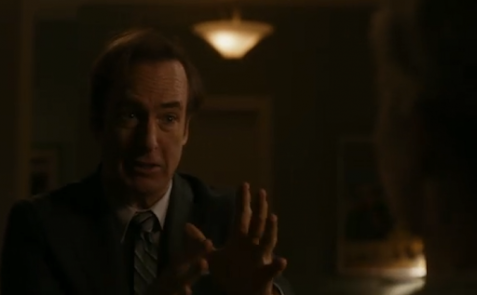Better Call Saul Reviews: “Bagman” (season 5, episode 8)
Is it even worth mentioning that this was Better Call Saul‘s best episode? Maybe I’ll change my mind with time, but as of now it’s easily keeping company with “Five-O” and “Chicanery” at the very top of the ladder.
Something occurred to me after posting last week’s review. In that episode, Eduardo spots the JMM on Saul’s bag, and he asks what it stands for. Saul replies, “Justice matters most,” which was the on-the-spot backronym he coined with Kim in the first episode of the season. Eduardo suggests that it could instead stand for “Just make money.”
Pretty clear distinction between the two interpretations, which is probably why I didn’t read much further into it. Later on, it occurred to me. They were discussing what “JMM” stands for, in terms of three letters standing in for three words. But, silently, the question assumes another meaning: What does JMM — as in James Morgan McGill — stand for?
What does Jimmy represent? What does he care about? What is important enough to him that he’ll die for it?
“Bagman” proposes an answer to that question. Maybe not a definitive one — we have a whole season to go after this one wraps — but it’s definitive enough to give JMM a huge shove toward letting himself become Saul Goodman.
The episode is fantastic, and also about as simple as it could possibly be. In fact, its very basic plot — Jimmy retrieves $7 million from the cartel to get Eduardo out of prison — isn’t even resolved before the episode ends. We get a beginning, a middle, and punch in the throat for expecting an ending.
And that, for this story, at this point in Jimmy’s life, as an illustration of the way in which “resolution” for him is getting farther and farther away, that’s perfect. It’s not a trick you can always get away with — in fact, I struggle to think of too many more examples of this working — but it was the right way for “Bagman” to conclude. Jimmy has made his decision, and he’ll have a long way to go before finding any kind of relief.
It’s going to get worse, in other words, before it gets any better. Debatably, it never does get better.
Which is the whole point. Soon after picking up the money, Jimmy is ambushed and very nearly executed. He’s saved by Mike, but their vehicles are damaged in the shootout. Mike and Jimmy hoof it back to civilization, one of them clearly handling the situation better than the other.
Jimmy asks Mike how he manages to keep going, and Mike gives a nice little speech about what’s important to him…what’s important enough to him that he would willingly put himself in this exact situation. For him, it’s his family, and leaving them in comfort whenever he happens to go. That’s enough for him to push through whatever it takes.
What is it for Jimmy?
We don’t know. The romantic answer would be Kim; he’ll push through as much as he can to make her happy, perhaps. But we know — and Jimmy knew — that she wasn’t happy with this situation, so that suggestion falls at the first hurdle. He did this in spite of her very rational objections. In that moment, at least, we see him arrive at a more practical answer: $100,000.
He could make Kim very happy by saying he won’t go through with it. He chooses to do the opposite. To paraphrase Mr. Burns, he’d be happier with the one hundred thousand dollars.
At least, he thinks he would be. He certainly isn’t happy with it in the desert. Mike is able to push through because he cares enough about something that keeps him going. Jimmy isn’t and doesn’t.
And this is going to represent a serious turning point for him. We’ve seen Jimmy navigate ethical dilemmas before, and he’s always been able to rationalize his behavior. Last week, for instance, he used a fictional family to gain sympathy for Eduardo while the actual family of Eduardo’s victim mourned in the courtroom. That’s a shitty thing to do, and Jimmy knows it, but he can also rationalize it. It’s his job. He’s playing the game. He needs to do what he can for his client. He’s being a good lawyer.
In short, he’s able to separate his job from other people’s tragedies. One may lead to the other at times, but he has one role to play and he can’t get caught up in worrying about what might or might not happen to others as a result.
But he can’t use that internal defense anymore. Not after this. Not after watching man after man fall around him. Not after being threatened with death and then splashed with his executioner’s blood. Not after having to be pulled out of shell shock by Mike. Not after this continuous, days-long, still-compounding trauma.
He can’t play dumb. He can’t argue that his actions don’t have consequences, that he shouldn’t be held accountable for them, or that he can ignore them.
He’s living them, here, now. He’s acutely aware of just what he’s done. From here on out, every time he weighs an ethical decision, he will do so with the conscious knowledge of the damage he could cause.
We know where he ends up. Breaking Bad — whose “4 Days Out” is obviously complemented by “Bagman” — makes it very clear that Saul Goodman will eventually know the damage he is causing to other people and will continue to cause it. What this episode shows us is the moment he becomes conscious of it.
It’s painful. It’s traumatic. It’s horrifying.
And still he’s going to choose to push through it. Because there’s something he cares about deeply enough to keep him going. Here’s a hint: Jimmy wishes it still came in $1,000 denominations.



Comments
Post a Comment